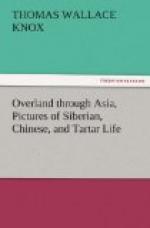She was next led through several apartments of a large building. In the first apartment several women were spinning incessantly, while others attempted to swallow balls of hemp. Next she saw women holding heavy stones in their hands and unable to put them down. Then there were parties playing without cessation upon musical instruments, and others busy over games of chance. In one room were men and dogs enraged and biting each other. In a dormitory were many couples with quilts of large dimensions, but in each couple there was an active struggle, and its quilt was frequently pulled aside. In the last hall of the establishment there were smiling couples, at peace with all the world and ‘the rest of mankind.’ The song closes with the guide’s explanation of what Swan’s Wing had seen.
“The women who spin now are punished because in their lives they continued to spin after sunset, when they should be at rest.
“Those who swallow balls of hemp were guilty of stealing thread by making their cloth too thin.
“Those condemned to hold heavy stones were guilty of putting stones in their butter to make it heavy.
“The parties who make music and gamble did nothing else in their life time, and must continue that employment perpetually.
“The men with the dogs are suffering the penalty of having created quarrels on earth.
“The couples who freeze under ample covering are punished for their selfishness when mortals, and the couples in the next apartment are an example to teach the certainty of happiness to those who develop kindly disposition.”
The region of the Lower Yenesei contains many exiles whom the government desired to remove far from the centers of population. These include political and criminal prisoners, whose offences are of a high grade, together with the members of a certain religious order, known as “The Skoptsi.” The latter class is particularly obnoxious on account of its practice of mutilation. Whenever an adherent of this sect is discovered he is banished to the remotest regions, either in the north of Siberia or among the mountains of Circassia. It is the only religious body relentlessly persecuted by the Russian government, and the persecution is based upon the sparseness of population. Some of these men have been incorporated into regiments on the frontier, where they prove obedient and tractable. Those who become colonists in Siberia are praised for their industry and perseverance, and invariably win the esteem of their neighbors. They are banished to distant localities through fear of their influence upon those around them. Most of the money-changers of Moscow are reputed to believe in this peculiar faith.
Many prominent individuals were exiled to the Lower Yenesei and regions farther eastward, under former sovereigns. Count Golofkin, one of the ministers of Catherine II., was banished to Nijne Kolymsk, where he died. It is said that he used to put himself, his servants, and house in deep mourning on every anniversary of Catherine’s birthday. Two officers of the court of the emperor Paul were exiled to a small town on the Yenesei, where they lived until recalled by Alexander I.




